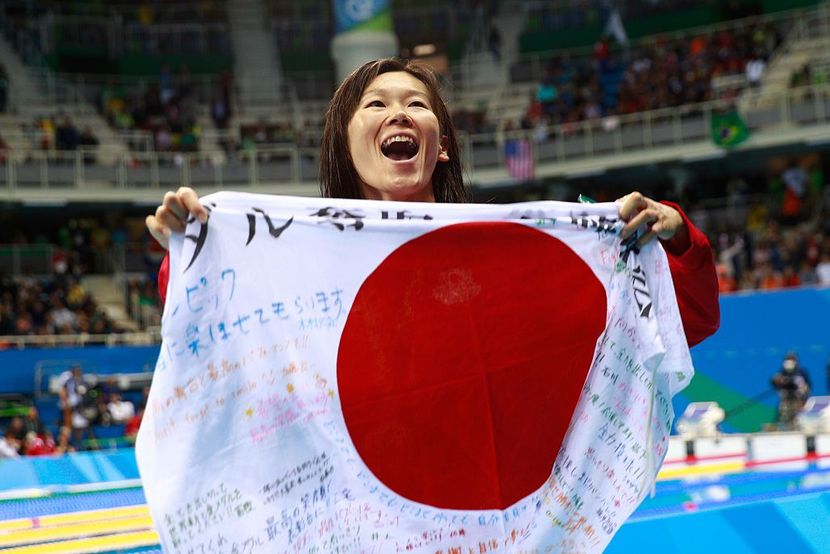
With #200 days to go to the World Aquatics Championships, we check in with Olympic champ Rie Kaneto as she brings her love of swimming to Japan’s next generation with learn to swim courses leading into next year's big event in Fukuoka.
Hosting major global sports events comes with benefits that stretch farther and wider than the competition itself. Part of the lead-in to the World Aquatics Championships coming this next July in Fukuoka, Japan has been aquatics icons from the hosting nation putting on learn to swim events.
Helping lead these community events is Rie Kaneto, the Rio 2016 Olympics gold medallist in the 200m breastroke.
The 21-time winner on the Swimming World Cup circuit has been holding youth swim clinics since October, with Kaneto’s six-stop caravan on events culminating in Fukuoka, Japan.
Now, with 200 days to go until Fukuoka holds the World Aquatics Championship for a second time, we had the opportunity to catch up with Kaneto.
Rie, you’ve visited Fukuoka many times. With the aquatics world set to visit Fukouka and need to fuel up between their final preparations and competing, how do you find the food?
While I have not previously had the time to leisurely explore Fukuoka’s cuisine, I often eat Hakata Torimon and Mentaiko when I come here. This time, I’ve been eating more stick ramen while I am here in the area. Fukuoka has many delights, and the food scene is one of them.
As you’ve made the transition from competitive swimmer to now becoming a swimming instructor, what have been some of your key learnings?
As an instructor, it is important to tell the students that nothing is impossible and to always challenge yourself.
Following with the theme of Fukuoka’s event slogan –“Everyone Meets the Future” – how have you felt going through this experience?
Teaching new skills to others always brings unique challenges for you to tackle. Depending on location and age, children’s swimming abilities vary widely. I experienced challenges in finding a way of teaching – and effectively communicating – to a wide range of students.
Fortunately, I’ve had help along the way. For this swimming caravan, the support staff assisted me in the lessons. I am very grateful for all their help.
The upcoming World Aquatics Championships will be again held in Fukuoka 22 years after the city and Japan held their last edition of the event. For Fukuoka 2001, I believe you would have been a junior high school student. Do you have any memories, and any dreams, from back then?
At that time, I did not even understand the difference between the Olympics and the World Championships. What I remember was simply wanting to swim faster, to be faster than anyone else.
Also, there was an athlete born in the same hometown who was someone who I greatly admired and that participated in the Fukuoka World Championships, so I was keenly following along and supporting their efforts over the T.V. screen.
Is there anything that you are expecting or really hoping for from next year’s World Aquatics Championships?
It will be a great World Aquatics Championships where I think the athletes and spectators will feel glad that they attended.
I hope that the world championships will be an event where the athletes will reflect back on and feel glad that they swam and worked hard to compete – including all the tears of frustration and smiling faces – rather than just an event focused on the results. I really hope that the spectators would feel similarly and glad that they came to the event and spectate.
I, too, would like to work hard to help realise the above for Fukuoka’s World Aquatics Championships so please let me know if there is anything I can do to help!
What would you like the younger generation to take away from next year’s World Aquatics Championships?
It is a rare opportunity to see international athletes who have large bodies and look strong. I want the children to watch the Japanese athletes compete with the international athletes and see just how they are able to overcome adversity. Aquatics are sports where people with different physical differences can excel. To see this in action is important.
While everyone has their strengths and weaknesses we try to overcome those weaknesses through creative means in order to be faster, stronger, and better, so I would like the children to specifically observe those moments.
Through that observation, my hope is that the children will feel that they too can try these techniques and implement them in their own races.
Any final message for the children following along who will lead the next generation?
At first, you may not succeed, and you may fail. However, please continue to work hard through all those hardships because the failures will increase the happiness and enjoyment that you receive when you finally succeed.
Contributing: Fukuoka World Aquatics Championships Promotion Department